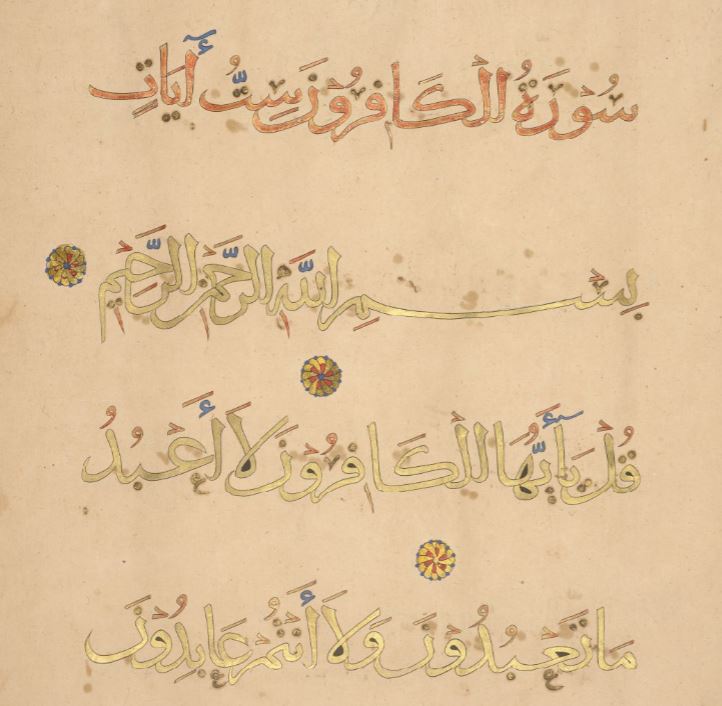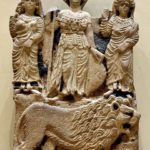
The Muslim jurists have distorted the saying of the Most High:“Unto you your religion, and unto me my religion.”[1] There is no doubt in my view that if even all the jurists of the world agreed on a matter that contradicts the command of God Almighty, then this unanimity of theirs should be considered invalid and rejected as having no value in our Islamic religion, for there is no doubt that the words of God cannot contradict each other.
WHEN IT WAS COLLECTED together following the death of the Messenger, the Qur’ān was assembled in several stages, the last of which during the era of the caliph ‘Uthmān ibn ‘Affān who delegated a group of Muslims to collect the Qur’ān from the memories of many and from what some others had preserved in written form what the Messenger had recorded about the words of God.
None of those contemporary with the Messenger or those who existed after him are free from error or sin, and that includes the Rightly Guided Caliphs. Given that any error or contradiction in the words of God revealed to His Messenger is an impossibility, and given that the Prophet is infallible:
Nor doth he speak of (his own) desire. It is naught save an inspiration that is inspired.[2]
if we or others find any contradiction in the Qur’ān there is nothing left for us other than to attribute it to human error slipping in between God’s words during the various stages of the collection of the Qur’ān, from the memories of those people and from what some of them wrote down, none of them being infallible. For we cannot possibly ascribe such errors or contradictions as existing in God’s words as conveyed to the Messenger. As for His saying:
Lo! We, even We, reveal the Reminder, and lo! We verily are its Guardian. [3]
the Almighty refers to His Exalted self as preserver of the Noble Qur’ān, and does not include equate any human being to this function, or any claim to this preservation, since He singled Himself out for that exclusively. Moreover, the sheikhs of Al-Azhar, and those among their jurors that preceded them or will succeed them have no right to claim to preserving the Holy Qur’ān. The Almighty did not exclude any messenger or a jurist from the general prohibition of copying, erasing, confirming or claiming to preserve the word of God, given that this exclusively pertains to His own Exalted Essence.
This abrogation is a slander, a distortion, an act of aggression and harm to Islam, to Muslims and to others
Likewise, the jurists have no right to provide their explanations for what may seem opaque in the words of God, since He has singled Himself out for that function as well. All of these aforementioned prohibitions are mentioned in clear, unambiguous verses, and there is no room for independent ijtihād concerning them. Here are the texts in which God informs us that copying, erasing, confirming or preserving the Holy Qur’an, or claiming knowledge of how obscure verses are to be interpreted are matters specific to God’s venerable essence alone:
With regard to abrogation the following verse is given:
Nothing of our revelation (even a single verse) do we abrogate or cause be forgotten, but we bring (in place) one better or the like thereof. [4]
Here it seems clear that God has singled out only His Exalted Essence for any abrogation. As regards any erasing or confirming, as well as interpreting any obscure meanings in the words known only to Him, the following verse was sent down:
Allah makes to pass away and establishes what He pleases, and with Him is the basis of the Book.[5]
It is clear that erasing or confirming, or interpreting obscure meanings is similarly dependent exclusively on His own Essence. No creature therefore has the right to interpret the obscure words of God, nor derive any meanings by deduction or speculation from among His words, since this would all constitute distorting or disfiguring the words of God Almighty – as some jurists do when saying that this or that verse has been ‘abrogated’. For this they use the passive voice ‘has been abrogated’, for they cannot say that God has abrogated it – because the Almighty did not abrogate it. Nor do they have any evidence that it was so abrogated. This is why they say: ‘it was abrogated’ by such and such a verse. Generally speaking the verse which they adduce to abrogate has no connection whatsoever with the verse the jurists have abrogated. They also always leave the identity of the abrogator, or the specific command to abrogate, unknown. They thus themselves bear the responsibility for abrogating the verse that has nothing remotely to do with the abrogated verse other than their own claims as jurists, all of whom are human beings subject to error and sin.
With regard to the title of this article and the verse You have your religion and I have mine, both earlier and contemporary jurists claim that this demonstrates the democracy of the Islamic religion, as a faith that is in harmony with our current era. At the same time they hold that this verse has been ‘abrogated’ by sūrat al-Tawba verse 5 which runs:
So when the sacred months have passed away, then slay the idolaters wherever you find them, and take them captives and besiege them and lie in wait for them in every ambush, then if they repent and keep up prayer and pay the poor-rate, leave their way free to them; surely Allah is Forgiving, Merciful. [6]
But given that this verse pertains to famous polytheists who expelled the Messenger from Makka and those who, when the Messenger recaptured Makka from them promised him good but subsequently betrayed the covenant and tried to expel him once again, the issue only refers to specific polytheists. It does not apply to other polytheists or non-believers or any others created by God. Our jurists have thus falsely claimed that this hostile verse abrogates friendly verses in the Qur’ān. This abrogation is therefore a slander, a distortion, an act of aggression and harm to Islam, to Muslims and to others.
There are many explicit verses in the Qur’ān that match the finest civilizational concepts in our current era
If anyone is not convinced of the facts I have presented concerning the distortion inherent in the abrogation of the verse Unto you your religion, and unto me my religion, then I invite them to read the Sūrat al-Tawba that the jurists adduce to abrogate this verse and other friendly verses. They will find that the subject refers to people from a know time and place who expelled the Messenger from Makka, and when the Messenger recaptured Makka from them promised him good but subsequently betrayed the covenant. Only these people are the ones God commanded to be killed at the end of the sacred months, not other Muslims or non-believers.
The verse Unto you your religion, and unto me my religion remains valid until the Day of Judgment and is not abrogated as the jurists claim. It constitutes one of the elements of justice and equality, and is in conformity with the concepts of democracy in our current age. Indeed, there are many explicit verses in the Qur’ān that match the finest civilizational concepts in our current era.

Suggested Reading
In the interpretations and fatwās of the jurists there is much distortion, a lot of lies and aggression, and much that is backward and is responsible for the failure of Muslims. This is especially the case in the jurists’ abrogating of the friendly verses in the Qur’ān without there being any Qur’ānic support for this. In each case their evidence comes from the sayings, fatwās and interpretations of their peers and predecessors.
I have previously asked many jurists to point out to me their Qur’ānic support for their innovated ‘Science of the Abrogator and the Abrogated’ but their response has been silence. I encourage everyone to ask them for their Qur’ānic support for this innovated discipline by which they have wiped out the word of God that called for peaceful symbiosis between people of all faiths. Qur’ānic evidence is required, not the views of jurist or this or former ages.
We worship God alone, as our Creator and the Creator of all things. We will honour and respect the jurists and others beside them for the good they bring to others. But we will oppose them and argue with them about everything that pushes Muslims to violate God’s command, and we base our argument and take our authority from the word of God alone, and not from the words of jurists.
[1] Qur’ān CIX (al-Kāfirūn), 6.
[2] Qur’ān LIII (al-Najm), 3.
[3] Qur’ān XV (al-Ḥijr), 9.
[4] Qur’ān II (al-Baqara), 106.
[5] Qur’ān XIII (al-Ra‘d), 39.
[6] Qur’ān IX (al-Tawba), 5.
Main image: The beginning of surat al-Kafirun, whose six verses end with لَكُمْ دِينُكُمْ وَلِيَ دِينِ “Unto you your religion, and unto me my religion“. Volume seven of a seven-volume Qur’ān commissioned by Rukn al-Dīn Baybars, later Sultan Baybars II, British Library Add MS 22412.
